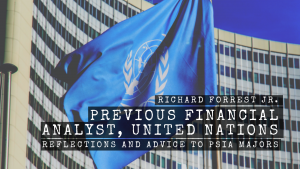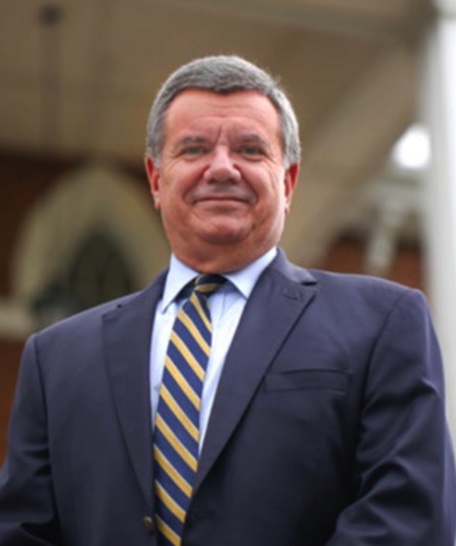Richard Forrest Jr., ’73, Reflects on Work at the United Nations

Newsletter intern Charlotte Walton interviewed Richard.
Q. How did you initially get involved with the United Nations?
A. When I graduated from North Georgia in 1973 with a BS in Physics and a commission in the Army, I was expecting to have a career in the military. A few years later I found myself working in the United Nations headquarters in New York. My path to a 21-year career in the UN was unique and at the same time common. Many of my UN colleagues came to the international organization by different but equally circuitous paths. We all agreed that our interesting paths enabled us to be highly qualified and relevant to the organization.
Q. How did your career with the United Nations develop? What did you gain from working in the UN?
A. The career in finance I followed after serving four years in the 101st Airborne Division and completing graduate school was my entry into the UN. I joined the UN in 1992, a very interesting time for international relations as new peacekeeping missions in Cambodia and the former Yugoslavia allowed me to use my military experience negotiating with Member States providing troops and military equipment to these large and significant missions.
In 1998 I moved to the International Labor Organization in Geneva where I used computer systems development and implementation expertise developed at the UN. Several years later I became involved in diplomacy, working with Member States, international Employer and Workers organizations to manage the finance and administration of this oldest of UN-family organizations; founded in 1917 as part of the League of Nations.
Q. Do you have any advice to students who believe they might want to work for the United Nations one day?
A. For you who are interested in international affairs, I suggest that you not think of the United Nations as a single monolithic organization but a family of international organizations that includes the UN (and its composite parts and organizations, like UNESCAP, UNECLAC, UNHCR, etc.), UN-family organizations that have their own government members and governing bodies separate from those of the UN (like the ILO, WHO, IAEA, WFP, etc.) and international non-governmental organizations (NGOs like the ICRC, MSF, IMF, World Bank, etc.). All of these organizations offer many opportunities for those of us with skills and interests in international relations.
Q. What was it like working for the United Nations?
A. What is it like to work in such organizations? Extensive opportunities to travel and live in many different parts of the world. Working daily with colleagues from every country in the world. Encouragement to learn languages, especially the five non-English official languages of the UN: French, Chinese, Arabic, Russian and Spanish. Excellent salaries and benefits (including living allowances based on your “duty station” and pension plans well-financed and managed by the organizations themselves). Those of us who entered the UN after military service will feel right at home with the military-like terminology and pay grades (GS being roughly equivalent to E grades; P and D being equivalent to O grades; grades above D-level are essentially political appointments). Opportunities for promotion and comprehensive training programs for career development, including sponsorship for higher university degrees and funding for schooling of dependent through university. One caveat: the best benefits are only available to staff serving in countries other than their home country (I have lived outside the US since 1998). Did I mention that while serving in a UN-family organization your salary and benefits are essentially tax free?
Q. How could a student at the University of North Georgia set themselves up to work there one day?
A. How to get in? The official way is to apply for a position through “vacancy announcements” that every organization publishes on its web site (https://careers.un.org/lbw/home.aspx?viewtype=SJ&vacancy=All, for the UN as an example). Every position has requirements for education (often a Master’s degree as a minimum), relevant experience, languages (usually English and one other) and patience. Although things have improved over the years, it can still take six months or longer for the hiring process to be internships and a “young professionals program” for entry-level positions. I can tell you, based on my own experience and that of many colleagues, there are many ways to find yourself working in one of these organizations. Your chances are only limited by your creativity and luck.
I feel honored to have worked in the UN and the ILO and highly recommend these and any other UN-family organization for a rewarding career and amazing life experiences. Best of luck to you all.


